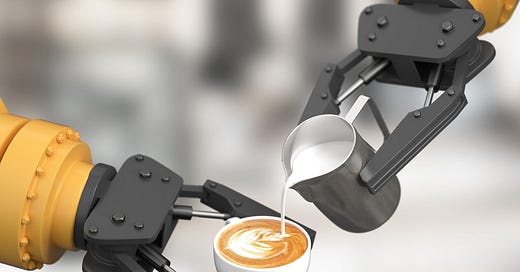Audio narration by David Marlow
Transcript:
David Marlow- For this week's coffee contemplation, I want to share a little story.
I blew it last week while I was ordering tickets online to see Mission: Impossible with my lovely bride, Alicia. I got the wrong seats. Now she has MS, so stairs can be a problem. There's a row at the ground entry level with handicap seating that makes it really easy for her to get in and out of the theater.
Well, apparently there are two handicapped areas—one at the entrance level where you come in, then one down low just three rows from the screen. Yeah, three rows from the screen. Guess which one my mixed-up mind ordered?
I couldn't find any way to cancel the tickets online since I'd ordered them that way, so I called the theater to ask what I could do. That's when this story gets interesting.
They answered the phone—like with a human being, like we did in ancient times, right?
In 30 seconds, this kind woman explained my options. Either I could come to the theater before the show to exchange the tickets, or I could return them online. She walked me through exactly how to do that to make sure the seats that I wanted were still available. If I went to the theater, they might be gone already.
Within minutes, I had returned the tickets, ordered the correct ones, and completed my mission. Mission Impossible, right? She even mentioned that returning online usually incurs some kind of service fee, which is why she offered the in-person exchange. It turns out I'm a rewards member for this theater chain, so there were no service fees. It worked out a hundred percent.
No automated messages telling me that most questions can be answered on their webpage. A simple conversation with a human who was willing to help save me what could have been hours of frustration.
Long before AI was even a thought—even to the degree it is today—Alvin Toffler pointed out something. I'm going to read it to you, and I want you to think about it as part of your contemplation:
"Society needs people who take care of the elderly, who know how to be compassionate and honest. Society needs people who work in hospitals. Society needs all kinds of skills that are not just cognitive—they're emotional, they're affectional. You can't run the society on data and computers alone."
As more and more of the work gets done by our machines—be they true machines or AI—the more valuable it will become for us as humans to do those things only a human being can do. That includes simply being human, one to another.
That's your coffee contemplation.
Quest well!






You are totally correct. An example is my 95-year-old mother. She lives in the country and the nearest town has about 800 people and that town is 10 miles from her house. She also likes her sports but couldn't always get them on an antenna, so she got a satellite dish. When she runs into trouble, she will call the customer service and there is always someone that will take her step by step on how to fix it so she can continue to watch her sports.
I love it when a plan comes together… plan A, plan B, etc. It helps us in our relations and that is the human part of adjusting to changes and meeting new people. The coffee cup that I bought my wife years ago has this saying on it: Today is the tomorrow that you worried about yesterday. - it all comes together.